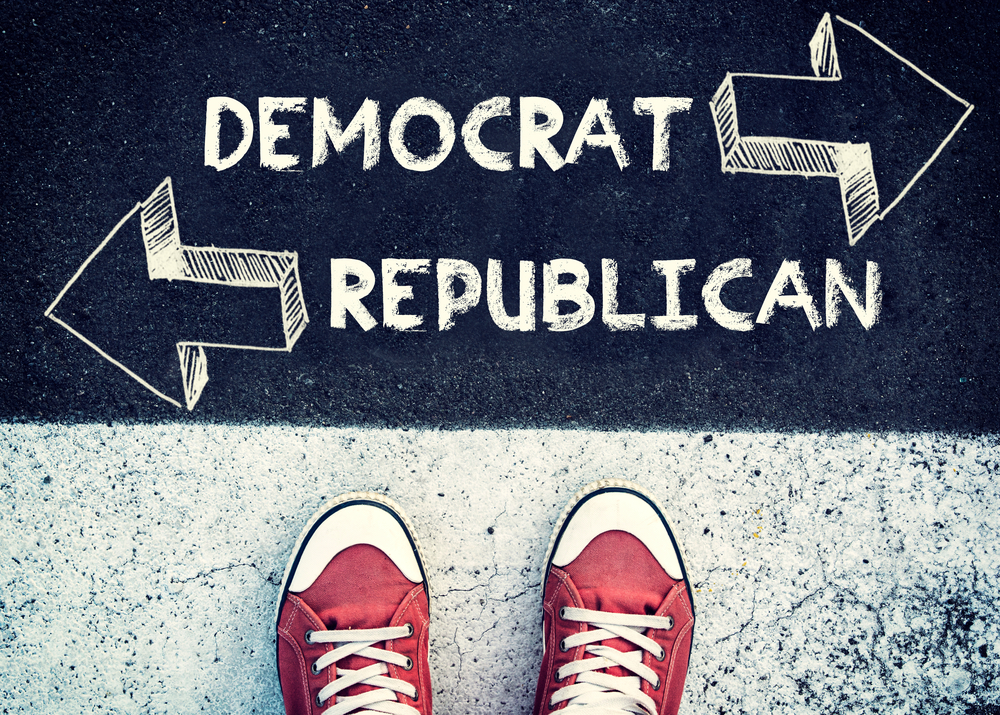Bipartisanship in our country may be at a low point, but bipartisan moral inconsistency seems to be more prevalent than ever. Republicans and Democrats alike appear to follow Lewis Carroll’s Red Queen in believing six impossible things before breakfast. They laud their own party’s candidates and officeholders while castigating those of the other party by applying two completely different standards that can be shifted as convenience dictates. Examples of these shifting standards are not hard to come by. Consider three recent examples.
First, as Ashleen Menchaca-Bagnulo explained so powerfully, moral conservatives in the 1990s talked at length about how inappropriate it was for Bill Clinton to be unfaithful to his wife, how damaging his behavior was to our country and to the institution of the presidency, and how it made him unfit to be our commander in chief. These same conservatives continue rightly to decry the decline of moral values in our society. Yet many of those who attacked Clinton and continue to champion moral conservatism also now champion the candidacy of Donald Trump, a man who has twice been divorced and who is on record boasting about his adulterous exploits. They do so because Trump is the nominee of their preferred party and thus is seen as better than Hillary Clinton. Even though the moral flaws of her husband are magnified in Trump, somehow these faults are no longer damaging to the country and do not call into question Trump’s fitness to be commander in chief. No difference is apparent except that Trump is a member of their political party and the Clintons are not.
Second, Democrats in the waning days of both Bush presidencies went on record saying that lame-duck presidents in their final year in office should not appoint anyone to the Supreme Court. They argued that the people should have their say via the ballot box as to who should make the next appointment. Republicans argued at the time that this was inappropriate as the president’s power of appointment was not limited by an election year. Yet when Justice Scalia died earlier this year, Republicans quickly adopted the Democratic line they had previously decried. And, when their own argument was used against them, many of those same Democratic leaders acted as if this was the most ridiculous proposal one could possibly imagine. The change in positions on both sides seems to have nothing to do with the principles proclaimed and everything to do with the political party in power.
Third, during the presidency of George W. Bush, Democratic Senate leaders expressed horror at the possibility of implementing the so-called “nuclear option” to allow judicial appointees to be confirmed with a mere majority vote instead of a supermajority, arguing that this would constitute a gross violation of Senate tradition and a tyranny of the majority over the minority. But a few short years later when they controlled the presidency and the Senate, Senate Democrats implemented that very option while the Republicans who had once contemplated it cried foul. What changed for the senators on both sides? Not principles, but the partisan identity of the president.
Start your day with Public Discourse
Sign up and get our daily essays sent straight to your inbox.The list of inconsistencies could go on, but the point would be the same. We are all too eager to support arguments that lead to the success of our party’s candidates or preferred policies, but we seem just as willing to repudiate those arguments and go completely in the opposite direction when that is deemed necessary to achieve our goals.
This problem is hardly new. Five centuries ago Machiavelli famously advised the prince that while it was useful to seem morally upright, it was often detrimental actually to be so. While princes in theory ought to keep their word, he believed that in practice the most successful ones were those who knew when and how to break it. In short, to Machiavelli, the question whether a prince ought to be morally good is one of expediency, not morality. This view has served as a foundation for much of the political theory that undergirds modern society. It encourages society to operate on the basis of a perpetual double standard, with those in power doing whatever they believe is necessary to achieve their desired objectives—regardless of its morality—while nonetheless enforcing traditional moral expectations on others.
This model is clearly morally problematic, but one can make a case for it as a potentially effective model in the kind of principality Machiavelli describes in The Prince or in the republic he describes in Discourses on Livy. But what are the consequences for a representative democracy when the major political parties both operate according to this kind of double standard? It is a real-life version of the classic prisoner’s dilemma: since neither party can expect the other to cooperate, neither will choose cooperation, and an outcome harmful to all is the likely result.
Such political double standards have long been operative in American politics. Yet in the past there were more relationships across party lines, more politicians who were willing to let what happened in an election campaign stay in the election campaign and not leak over to poison governance between elections. I recently taught John F. Kennedy’s Profiles in Courage and was reminded of examples of political courage in American political history—and of Kennedy’s own subtle Machiavellianism. By detailing American examples of political courage, Kennedy was also making the case to the American people that he understood such courage and was able to exercise it. In choosing George Norris and Robert Taft (members of the political party he sought to dislodge from the presidency) as his contemporary examples of courage, he tried to send the message that he was bigger than party politics and could rise above it. Yet there was a real respect and even friendship between Kennedy and some of his Republican counterparts. This was manifested, for example, in Vice President Nixon (whom Kennedy would later defeat for the presidency) not allowing his party to use Kennedy’s absence from the Senate following back surgery to change the balance of power.
In a similar way, while party unity has always been important, party leaders in past eras have been willing to stand up to the president of their own party, whether it was the Democratic Party realizing that Franklin Roosevelt’s court-packing plan would harm the separation of powers, or Republican senators led by Barry Goldwater informing President Nixon that they could no longer support him in the impeachment fight. These examples remind us that there is a higher political calling than being loyal to one’s party and seeking its victory. American partisans of earlier eras recognized this truth—not only in theory but in practice too.
I do not want to overstate my case here. Inconsistency in political arguments is a longstanding feature of American politics, and there are examples of contemporary courage, as seen in the stand that Mitt Romney and Ben Sasse have taken against Donald Trump’s candidacy. In a similar way, one gets the sense that Robert Byrd and Daniel Inouye really were committed to the procedural rules of the Senate to such an extent that they would probably have prevented those being changed in the way Harry Reid did after their deaths.
Yet with these exceptions aside, it is clear that American party politics today has a standard operating procedure that is politically understandable but morally inconsistent. To return to the three examples I began with, if a behavior is morally inappropriate and disqualifying when found in Bill Clinton, the same behavior is inappropriate and disqualifying when found in Donald Trump. If a particular use of executive power is an abuse of power when George W. Bush does it, then it is also an abuse when Barack Obama does it. And if it would constitute a tyranny of the majority to act in a particular way when Republicans control the Senate, then the same would be true when Democrats control the Senate. If, on the other hand, our objection to Bill Clinton, George W. Bush, or whoever else is about politics rather than principles, then we need to be honest and make the argument on those grounds.
We must not claim the moral high ground only to abandon it for the convenience of our own party while proceeding to deny that it ever was the moral high ground in the first place. Only when we are willing to hold our own party to the same standards to which we hold the other party will we be able to improve our national politics.














